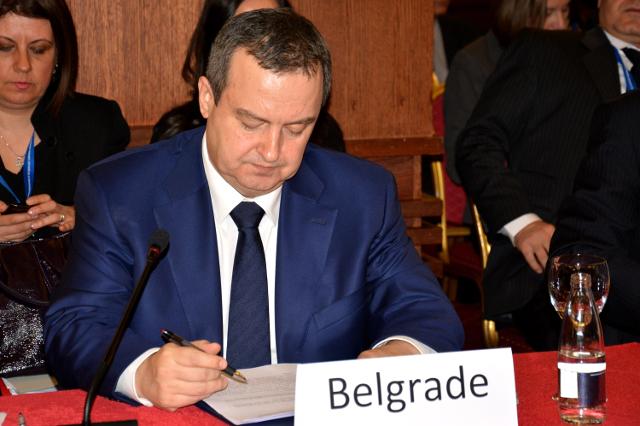EU accession main goal; Serbia won't be migrant center - FM
The main objective of Serbia's foreign policy remains unchanged - membership in the European Union, Ivica Dacic said on Tuesday.
Tuesday, 02.02.2016.
14:50

EU accession main goal; Serbia won't be migrant center - FM
In his speech, carried by the Serbian government's website, Dacic said that in a bid to achieve this goal, "Serbia demonstrated consistency, both through the implementation of its ambitious reform agenda, as well as through its constructive approach to the dialogue with Pristina.""Regrettably, Serbia had to wait for almost two years from the commencement of the negotiation process before opening its first negotiating chapters. We intend, which I hope will be supported by EU member states – to significantly accelerate the negotiations and embark upon the negotiating chapters so vital to the reform process and the enhancement of the rule of law, such as Chapters 23 and 24 in the first place, as well as many other chapters. The opening of each and every chapter is extremely important to us, as a stepping-stone in the further process of alignment with European norms and standards," Dacic, said, adding that "a strong and stable economy is an important precondition for EU membership."
According to him, the Serbian government "succeeded in stabilizing public finances, cutting the fiscal deficit and in adopting a number of reform laws in almost all areas, while fiscal consolidation measures created the basis for concluding the negotiations and signing a stand-by arrangement with the International Monetary Fund," and intends to "persevere on its reform course."
"The enlargement policy is certainly one of the vital EU instruments for ensuring not only stability and economic prosperity in the region but also the stability and security of the EU as a whole. This places particular emphasis on joint engagement of SEECP participants, in the light of their positioning towards EU institutions, projecting a positive image of the region as a whole, and keeping the EU focused on issues of interest to the region. In this context, the role played by EU member states is vital, as they can contribute significantly to the process of bringing the whole SEE region closer to and eventually joining the European Union," Dacic said.
According to him, the region in the past year "faced numerous challenges together, challenges having a considerable capacity to destabilize, or even jeopardize the security, and yet we managed to preserve the stability in the region, where a large role was, no doubt, was played by the European Union and some EU member states."
"The Republic of Serbia will continue to implement an open and constructive regional policy and remain committed to the best possible relations with all neighbors," he said.
Speaking about the migrant crisis, he said the majority of SEECP participants are facing "the greatest migrant crisis since the end of the Second World War - while developments in the previous period point to the potential that the ongoing global migration wave might direct the movement of several million migrants towards the EU via the Balkans and the Mediterranean."
"Although the majority of migrants who enter the territory of Serbia from Bulgaria and Greece, through Macedonia, express intent to apply for asylum, it is clear that Serbia is just one of the countries on their way to Western Europe. Serbia, like EU member states, faces the same pressure, especially in terms of available resources and means which are certainly far less than those available to EU member states. In 2015 alone, over 600,000 people entered the territory of Serbia, most of whom came from Syria and Afghanistan. At times, the daily entries reached the 9,000 mark. Although we are well into winter now and the pressure has been reduced, a large number of migrants cross the border between Serbia and Macedonia every day. In January this year, nearly 60,000 migrants already entered Serbia," Dacic said.
As a country midway along the Western Balkans route, Serbia "suffers the consequences of the decisions made by all the countries that are either on its lower or upper end" and "specifically pointed to the need for early notification of all countries involved (Austria, Germany) so that all countries along the route be timely informed about regime change at the border and about any new measure applied in the countries of final destination."
As an example, he said that "after the countries on the upper end of the Western Balkans route decided to stop taking in economic migrants, followed by the decision of Austria to allow passage through its territory only to those migrants who expressly intend to apply for asylum in Germany and Austria, the Republic of Serbia has started to act in the same way, as it cannot let the whole burden be shifted onto its shoulders."
"We believe that we have so far acted as a credible partner to the EU, especially considering that we have shown readiness to take our share of responsibility and agree to provide temporary shelter for a number of migrants, though we are not an EU member state. However, if there was a chain reaction and a drastic reduction in passage through or closing of borders (Germany, Austria, and further along the route), it would create a particularly dangerous situation for Serbia and the entire region. This would halt the flow of migrants and cause them to stay longer and in more massive numbers in Serbia, putting an enormous strain on us. For all our understanding and empathy we feel for migrants, we cannot allow Serbia to be turned into a kind of a collective center for migrants. Serbia is not able, either, to re-admit the migrants who have transited through its territory and were refused asylum in the EU. It has neither the capacity nor the resources to do so, nor was it the country of their first entry," Dacic said.
The Serbian minister concluded by saying his country "expects to discuss this subject later this week at the Informal (Gymnich) Meeting of Ministers for Foreign Affairs of EU member states and candidates" and that he thought it "very important" that today’s meeting would adopt a joint statement on "Migration Challenges."
The informal meeting in Sofia today was attended by foreign ministers of Bulgaria, Montenegro, Albania, Bosnia. Macedonia, Romania, as well as member of the Kosovo government Edita Tahiri, deputy foreign ministers of Greece, Croatia, Turkey, and Moldavia, a Slovenian state secretary, representatives of the European Commission and the secretary general of the Regional Council for Cooperation.





















Komentari 3
Pogledaj komentare